

» What I’ve Learned About Learning. ‘We learn more by looking for the answer to a question and not finding it than we do from learning the answer itself.’
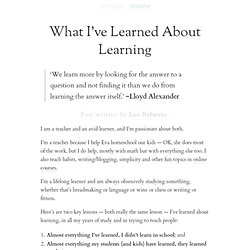
Why Corporate Training is Broken And How to Fix It. Why Corporate Training is Broken And How to Fix It Executive Summary 3. The practice of a learning technologist. I recently undertook a study to help me go my job better.
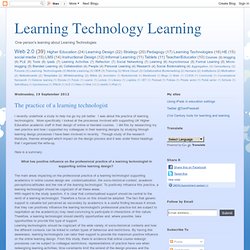
I was about the practice of learning technologists. More specifically I looked at the processes involved with supporting UK Higher Education academic staff in their design of online or blended courses. I did this by researching my own practice and how I supported my colleagues in their learning designs by studying through learning design processes I have been involved in recently. Through study of the research literature, themes emerged which impact on the design process and it was under these headings that I organised the write-up. Www.jarche.com/wp-content/uploads/2009/04/76080422commpractice.pdf. Howard Rheingold on how the five web literacies are becoming essential survival skills.
Howard Rheingold isn’t too concerned about whether Google is making us stupid or if Facebook is making us lonely.
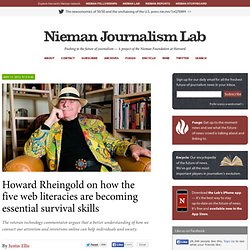
Those kind of criticisms, Rheingold says, miscalculate the ability humans have to change their behavior, particularly when it comes to how we use social media and the Internet more broadly. It’s not about knowledge transfer. Danah Boyd: Putting people first » Whether the digital era improves society is up to its users – that’s us. TouchingCulture. The key to informal learning is autonomy. Five Trends to Watch in Educational Technology. Preparing for the future of work with PKM. Hugh Macleod, one of my favourite cartoonists and someone who really understands the networked economy, recently asked; How Do You Best Prepare For The Creative Age?
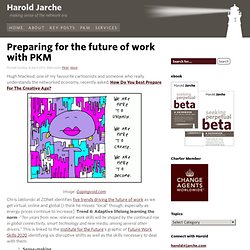
Image: Gapingvoid.com Chris Jablonski at ZDNet identifies five trends driving the future of work as we get virtual, online and global [I think he misses "local" though, especially as energy prices continue to increase]. Trend 4: Adaptive lifelong learning the norm -”Ten years from now, relevant work skills will be shaped by the continued rise in global connectivity, smart technology and new media, among several other drivers.” This is linked to the Institute for the Future‘s graphic of Future Work Skills 2020 identifying six disruptive shifts as well as the skills necessary to deal with them:
Who Is Managing Your Learning? PKM Workshop: learning out loud. Sometimes it helps to learn out loud – LOL.
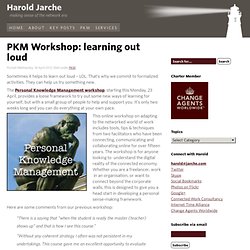
That’s why we commit to formalized activities. They can help us try something new. The Personal Knowledge Management workshop, starting this Monday, 23 April, provides a loose framework to try out some new ways of learning for yourself, but with a small group of people to help and support you. Webinar recording: In conversation with Mark Britz. A mini-course on network and social network literacy - howardrheingold's posterous. The Complete Educator’s Guide to Using Google Reader. Love it!?
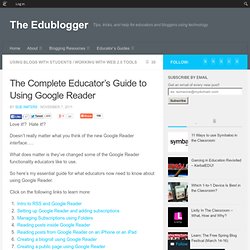
Network Learning: Working Smarter. “In the period ahead of us, more important than advances in computer design will be the advances we can make in our understanding of human information processing – of thinking, problem solving, and decision making…” ~ Herbert Simon, Economics Nobel-prize winner (1968) The World Wide Web is changing how many of us do our work as we become more connected to information and each other.
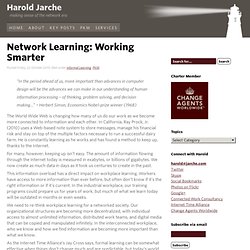
In California, Ray Prock, Jr. (2010) uses a Web-based note system to store messages, manage his financial risk and stay on top of the multiple factors necessary to run a successful dairy farm. He is constantly learning as he works and has found a method to keep up, thanks to the Internet. For many, however, keeping up isn’t easy. To learn, we must do. As I was preparing to start our online PKM workshop last night, I came across one of the best articles that I have read in a long while that reflects the value of what the PKM framework supports.
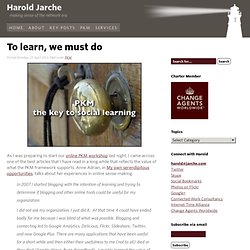
Perspectives in Personal Knowledge Management. Academic Stuff that Simply Make Me Smile. The Next Time Someone Says the Internet Killed Reading Books, Show Them This Chart - Alexis Madrigal - Technology. Remember the good old days when everyone read really good books, like, maybe in the post-war years when everyone appreciated a good use of the semi-colon?
Everyone's favorite book was by Faulkner or Woolf or Roth. We were a civilized civilization. This was before the Internet and cable television, and so people had these, like, wholly different desires and attention spans. They just craved, craved, craved the erudition and cultivation of our literary kings and queens. Well, that time never existed. Loose Hierarchies, Strong Networks. When I wrote that the only knowledge that can be managed is our own, I wanted to highlight that command & control methods do not work well in this network era that is replacing the industrial/information era. In our increasingly complex work environments, we should should take the advice of Snowden & Kurtz who recommend “loose hierarchies & strong networks” as shown in this image by Verna Allee. While a certain amount of hierarchy may be necessary to get work done, networks naturally route around hierarchy.
Networks enable work to be done collaboratively, especially when that work is complex and there are no simple answers, best practices or case studies to fall back on. Finding and following on online networks - Apr 18. This is the third webinar in the three-part series "Getting online information to come to you," but stands alone, so feel free to attend, regardless of whether or not you participate in the others.
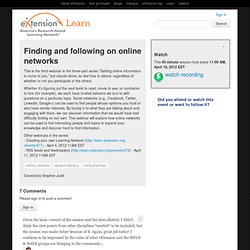
Whether it’s figuring out the next book to read, movie to see, or contractor to hire (for example), we each have trusted advisors we turn to with questions on a particular topic. Social networks (e.g., Facebook, Twitter, LinkedIn, Google+) can be used to find people whose opinions you trust or who have similar interests. Creating your own Learning Network - Apr 4. This is the first webinar in the three-part series "Getting online information to come to you," but stands alone, so feel free to attend, regardless of whether or not you participate in the others.
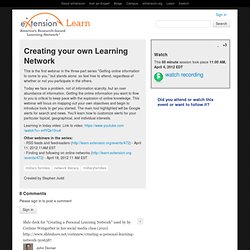
Today we face a problem, not of information scarcity, but an over abundance of information. Getting the online information you want to flow to you is critical to keep pace with the explosion of online knowledge. This webinar will focus on mapping out your own objectives and begin to introduce tools to get you started. The main tool highlighted will be Google alerts for search and news. Alerts - Monitor the Web for interesting new content. A New and Simple Way to Measure Social Media ROI - Forbes. Tailoring Twitter: The ROI of Curating Content on Twitter. April 25, 2011 Liz published this at 7:37 am What You Share Defines You Last year, I started experimenting with curating content on Twitter. I had three good reasons. I realized that Twitter was no longer an extension of blog, but had become it’s own thing.